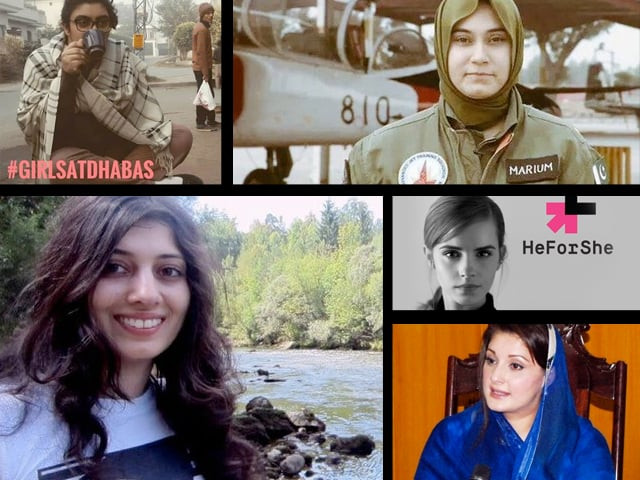What the F word meant for Pakistan in 2015
Is the country closer to embracing feminism as a step towards gender equality?

PHOTO: FILE
In recent years, Pakistan has seen a lot of “firsts” owing to women. At the tail end of 2015, Rahila Hameed Durrani was elected as the first-ever female speaker of the Balochistan Assembly. Muniba Mazari was named Pakistan’s first female goodwill ambassador to advance gender equality and the empowerment of women and girls by UN Women. Iron-fisted Ayesha Mumtaz gave owners of sub-standard eateries in Punjab sleepless nights as Director of Operations at Punjab Food Authority, and rose to fame thanks to her unrelenting firmness during raids. And fighter pilot Mariam Mukhtar added the name of a woman in the list of Pakistan Air Force fighter pilots to die in the line of duty. The year has been particularly significant in bridging some of the gender disparity that the country battles day in, day out.
Female co-pilot dies as training jet crashes in Mianwali
 Mariam Mukhtar. PHOTO: FILE
Mariam Mukhtar. PHOTO: FILE“Women and girls in Pakistan are taking many strides to reclaim public spaces and challenging the concept of women belonging inside ‘safe spaces’, spaces largely identified by a male dominated society,” says lawyer and gender activist Maliha Zia Lari, adding that an increasing number of girls and women are taking up jobs and activities previously considered to be male domains. “This is extremely positive.”
Public places, public office
What initially started as a hashtag, #GirlsAtDhabas ended up becoming a jump start to fresh conversation about how women can – and must – frequent all public spaces, including dhabas, police stations, courts and even mosques.
#GirlsAtDhabas aims to make dhabas run by women a reality
 PHOTO: FILE
PHOTO: FILE“The year 2015 ends on a high note as women's leadership role is getting increased recognition. In traditional milieus such as Khyber-Pakhtunkhwa (K-P) and Balochistan, women are leading the provincial legislatures," says columnist and activist Raza Rumi, and particularly mentions how Rahila Durrani also happens to be a well-known civil society activist. “She brings with her years of experience as a women rights defender.”
The social ripples are many, but there is little simultaneous effort at the state level, and there is too low a number of senior female politicians, female politicians in important decision-making positions, female CEOs and judges. In a recent write-up, former vice chancellor of the Lahore University of Management Sciences (Lums) Adil Najam suggested that after 137 male justices of the Supreme Court of Pakistan, the time is ripe to appoint a woman. But top positions in all spheres, for the most part, continue to be ruled by men.

Lari mentions how the recent local government elections once again evidenced agreements whereby women were disenfranchised from voting. “It is a paradoxical situation where social change is happening, but it has not yet been translated into an institutional actual policy at the state level.”
She says there is little discourse in what feminism actually is, even within the women's movement and women's NGOs. “Few, if any, would recognise the iconic names of the feminist movement such as Judith Butler or Simone de Beauvoir, or even Pakistani feminist icons such as Tahira Mazhar Ali, Nighat Saeed Khan, Nigar Ahmed, Shahla Zia or Farida Shaheed,” says Lari. She adds that it is a pity that we do not institutionally focus enough on the ideology and choose to focus more on finishing projects.
On a more upbeat note, Rumi observes that within the dynastic framework, another woman leader – Maryam Nawaz – is emerging within the PML-N, which has been known for its conservatism.
 Maryam Nawaz. PHOTO: FILE
Maryam Nawaz. PHOTO: FILEWith a narrative building around feminism being taken seriously, Pakistan has a rising number of men who identify as male feminists, like Anthony Permal, a marketer by profession. “Male feminism, to me, is about standing alongside women in their daily existence, not ahead or behind and certainly not 'for'. Women, like men, are their own masters.”
Yet, Permal recognises that leave alone male feminists, even women in Pakistan sometimes have a knee-jerk reaction to the term, seeing it as a borrowed Western concept. “Our deeply patriarchal society has so pressed misogyny into the bare bones of the populace that even many women are anti-feminist, allowing their religio-cultural dogmas to supersede the support of their own gender,” says Permal.
HerStory
Fortunately, women like Suniya Sadullah are blazing the trail for others. In Suniya’s family, the only professions considered respectable were becoming doctors or teachers. But she had other ideas when, at the age of 12, she watched her first ever motor race on TV. Her aim in life there onwards became to be a part of a Formula 1 team. She has succeeded in pushing the boundaries of the norms of a traditional Pathan family and realised her dream: this motorsport engineer is the first female Pakistani to have worked for the Williams Formula 1 team. “I’ve had an unconventional career route for a girl from Khyber-Pakhtunkhwa," she tells The Express Tribune.
 Suniya Sadullah. PHOTO: twitter/ Suniya Sadullah Khan
Suniya Sadullah. PHOTO: twitter/ Suniya Sadullah KhanSuniya shares how her support has been the men in her life but her role models have been women. Her mother wanted to put her in a co-education school, a decision her father supported. “I was one of the first girls in my family to study in such a school,” says Suniya. After working with Williams for some three years, she is presently pursuing a PhD in Aerospace in Pakistan. “My husband has been extremely supportive. We actually had a long distance marriage for about eight months while I decided whether to continue working in Formula 1 or pursue my next goal, which was a PhD.”
According to Rumi, the real change taking place in Pakistan is within the higher education sector. “Nearly half of public sector universities comprise women [in the] student body. Their entrance into such places happens due to increased mobility as well as superior performance in academics.”
Globally, too, the importance of bringing men on board for empowerment of women has gained momentum, and though feminism started out as a movement by women for women, men are now seen as part of the synergy. “HeForShe”, a solidarity campaign for gender equality initiated by UN Women, popularised the thought further.
End violence against women: ‘We all stand to gain from empowering women’
 PHOTO: FILE
PHOTO: FILEHeForShe started a campaign with the goal of engaging one million men and boys by July 2015. They may have failed to meet the goal, but supportive men are not as rare as they once were.



















COMMENTS
Comments are moderated and generally will be posted if they are on-topic and not abusive.
For more information, please see our Comments FAQ